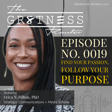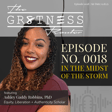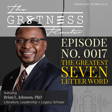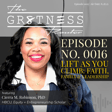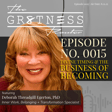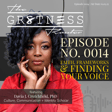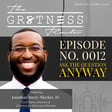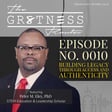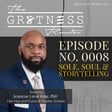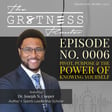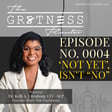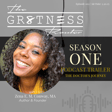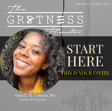Introduction to 'The Greatness Router'
00:00:08
Speaker
This is the Greatness Router, where we connect purpose to process one conversation at a time.
00:00:25
Speaker
And we are live. You are listening to The Greatness Router, where purpose meets process, one conversation at a
Introducing Dr. Frederick Ingram Jr.
00:00:33
Speaker
time. I'm your host, Zena C. And today's guest is Dr. Frederick Ingram j Jr. Dr. Ingram is a friend of mine and a classmate from the great Johnson C. Smith University.
00:00:46
Speaker
Dr. Ingram or Dr. Frederick V. I want to know what this V stands for, but that's for another conversation. Dr. Frederick V. Ingram Jr. is a critical race scholar who situates his work in understanding how African-Americans make sense of their experiences with race, racism, and anti-Blackness within higher education and the criminal justice systems.
00:01:10
Speaker
He is the author of Black Liberation Through Action and Resistance, MOVE, And has published his works in other media outlets such as Blavity, Diverse Issues in Higher Education, and Forbes. Oh my gosh.
00:01:24
Speaker
Let's dive in. Did I miss anything? i mean, listen, we'll be here all day. I know that's right. I know that's right. um I am just truly grateful for you taking the time out of your busy academic and life schedule to you know join me to speak to my my listeners, our listeners at this point in time, and to really help me bring forth the next generation of um of young people so that they can recognize the different pathways to their own greatness.
00:01:58
Speaker
I'm so grateful for you. I appreciate that. Anytime somebody from Smith, most people from Smith, reach out and ask for me to pop up, I'm always down to do that.
00:02:09
Speaker
So I'm honored to. No, thank you. Thank you. Thank you. Thank you. um
Icebreaker: Conversing with Historical Figures
00:02:15
Speaker
All right. So I like to start with an icebreaker. Granted, we've already had our kikis, but you know let's warm let's warm the people up a little bit.
00:02:23
Speaker
um And this I feel like this kind of this question is not foreign from you and you're going to come with a question with a response like way too quickly, but I'm here for it. If you could have a candid, unfiltered conversation with any historical figure, who would it be and why Harriet Tubman I see I told you I wasn't like Harriet Tubman or like Nat Turner like the the disruptors the rebellious ones because i just want to know what they heard from God that's love it it was their duty to lead the people to be disrupted to not
00:03:08
Speaker
to not lean into respectability, to be the change that they so badly saw. And what was the pivotal moment specifically that was like, this is happening now.
00:03:20
Speaker
I know what mine was, but I would love to hear from them personally what theirs was. Oh my gosh. That would be extremely enlightening. I love it. I see. I knew you were going to have something already like predetermined. Like han I thought about this 20 years ago, probably before that I'm here for it. I respect it because look, look, ah the movers and shakers, the disruptors are the ones who are going carry us forward. So I respect it.
Defining Purpose and Career Path
00:03:45
Speaker
For sure. So let's get into the purpose behind your work. um i started this podcast because you can talk all day about the what, but I really want to get into the the meat and potatoes of the why, like what brought you to where you are to that point to, you know, I, this is my soapbox. This is the, the, um the pinnacle of what I'm willing to lay it all down on the ground for like
00:04:16
Speaker
I want to get into the nitty gritty of what that why is. So um if you had to pinpoint, and I feel like you just, you just brought this up. If you had to pinpoint the moment you knew that this was your calling, that, that this conversation, this movement, I'm going to call it a movement was your calling.
00:04:34
Speaker
Where would that position be in your, in your timeline? I think it's so interesting because I feel like it isn't like one particular moment, but I feel like it's like a series of, you fortunate and like and unfortunate events, I think, I think all of these things served as, as like seeds, right. That ultimately led me to, to this place. And I think all of those experiences kind of like wired or hardwired me when it was time to move, right. When it was time to like act.
00:05:03
Speaker
And i think, you know, lots of different experiences that took place, right. Loss of a relative to the system and our family didn't even know about it. Um, And we found out after, you know, his passing and just like different things like that. But I think the one, the thing that like jolted because I was headed to law school. I tell people it's like probably more recently. Like I was headed to law school. I was, I took the LSAT twice and was for i applying to law schools like at that time. And I was also at American University in DC.
00:05:34
Speaker
And it was like, this was 2016, that election cycle. So we were fake, you know, um President Obama was, was, ending his second term. It's a big transition.
00:05:45
Speaker
Yeah. Who was it going to be? Was it going to be Clinton or was it going to be that other man? and And I began to notice, right, like all the shifts beginning like take place in D.C. like very quickly, very abruptly.
00:05:57
Speaker
Obama's still in office, but these things are beginning to happen. And I remember specifically an experience where a young Black undergrad woman was physically assaulted by a staff member who I believe they said was a veteran because the students were protesting. Students were protesting and they were burning flat, which is, you know, their right to do.
00:06:19
Speaker
Whether people agree with it or not, that's the right. um like Physically assaulted Hart. Now there white males out there protesting. There are white folks protesting. He physically assaulted the black the girl that he saw. Sorry, remember that.
00:06:30
Speaker
On top of that, there were the the African-American undergraduate women were being physically threatened and in terrorized by white male frat boy upperclassmen, like throwing bananas at them and just, you know, doing different, very racialized things toward black women.
00:06:50
Speaker
So this was my first semester. And then the second semester, Taylor Gumpson becomes the first, you know, she becomes the first elected black woman student body president.
00:07:01
Speaker
She also happens to be an AKA. So we woke up the day after, I believe her swearing in in the morning that after that, there were nooses on campus with bananas and then, you know, on a banana. The student body president.
00:07:14
Speaker
Yeah. They were targeting her. And when even undergrads were like people in the community off campus and there were like Harambe Bay and like AKA like on the banana that were hanging from the nooses. So I see big these things happening and all of this taking place.
00:07:28
Speaker
And now these are there have been racialized experiences there prior to my arrival at that institution, but like this felt different. And I remember thinking to myself, like law school is cool, and you know if that's where I'm supposed to end up, then cool, but I feel like I'm supposed to be doing something else. And feel like I needed more so on college campuses, like these Black students and non-Black students need to see me, hear me, hear my perspective, hear my voice.
00:07:56
Speaker
And in that moment, I stopped applying to law school and applied to the only doctoral program that I applied to. And that was the one I got into and the one that I completed, right? Look at God. Right. It was in that sort of like listening to like, I feel like, I feel like I'm headed the wrong path.
00:08:12
Speaker
And this, all of these series of events are taking place are, leading me to where I'm supposed to be going. okay I literally called my cousin, who was a doctoral student, and talked to her.
00:08:23
Speaker
And I was like, I think I need to and need to pivot. And that day started searching for doctoral programs that were like deeply social justice oriented like in their foundations. And that's how it ended up at Northeastern.
Resilience and Preparing Future Generations
00:08:37
Speaker
That's amazing. I mean, it it it goes back to the series of fortunate yet unfortunate events. Like it's amazing how we have to be uncomfortable. our change comes out of discomfort.
00:08:50
Speaker
Let me, let me put it like that. So I truly commend you for even recognizing that you needed to pivot, even though you had already like semi committed to a path, like you're already like, you know what, right?
00:09:04
Speaker
I have a different cape I need to put on right now. This this one isn't it. For sure. I think it's interesting you know but being open to that because so many of us have those aha moments and we ignore them.
00:09:16
Speaker
Yeah. yeah Right. I think when you ignore your aha moments, it kind of leads you. Because I think I i had an aha moment earlier, right, on after undergrad and I didn't listen. And then I felt like my career trajectory was stunned because of not listening.
00:09:31
Speaker
So I told myself that if I was given a second chance to correct it, that I would not let fear keep me from growing. Yeah. That's huge. That, that is a, that is a major key as Khaled would put like that.
00:09:47
Speaker
not allowing being scared to stop you from changing direction. Like you, you knew you felt in your, in your, your person, in your soul that it was time to do something else. And I respect that.
00:10:00
Speaker
I can appreciate that pivot point. Yes. yeah um OK, so let's talk about resilience, because every who you want to speak to, they had to be resilient. You know, ah who you are speaking to, we have to be resilient. Who you are are um building your brand and your person to be, it has to be a resilient person.
00:10:27
Speaker
individual and a resilient entity, what keeps you in the game in the midst of, of even today's temperature in the midst of everything else, what keeps you in the game with things like to just help you keep going and to, to work as smoothly as it is and outsider looking in, I know that mental health is big on you, big for you. Yeah.
00:10:46
Speaker
Yeah. So I think part of it is recognizing like that. So many of us are still not yet awake, right? So many of us are still not aware what's taking place, what's happening, and how our actions or inactions also allow for like some of this to take place. right I often talk about people not understanding white supremacy enough, not hating it enough, not being aware of our own positionality within that system, and that within that structure, and how our being empathetic or ambivalent to that structure and the role that we play in it allows for these types of things to happen.
00:11:21
Speaker
And then I think about like my nieces and nephews going down college age, and yeah making decisions. I have a niece who lives in Florida, right? I worry about her consistently. I have a ne I was literally talking to them in group chat this morning about like, what if what are your plans? I have a niece who's a senior, right, an undergrad, and then her siblings are coming behind her both.
00:11:40
Speaker
One graduated last year, she took gap year, and then a sister graduated this year. And we're talking about, like, what are y'all plans? Like, what are y'all, what are you planning to do? And how is college a part of that conversation to get where you need to go? So I think about, as, you know, imagine futures. I think about even beyond me, right, the next generation that perceives us, right, or that follows us.
00:12:02
Speaker
And and And what kind of place I want them to be able to live in. And so I think those are parts of the things that oh drive me. People ask me all the time, are you Afrofuturist or Afropestimist? And i said, I reside somewhere in the middle, right?
00:12:18
Speaker
ah next You know what I'm saying? Because I think I'm a realist in a lot of ways, but I think about, again, the imagined futures and the way that we birth those futures through our own foresight, through our own experiences, through things that we we
Intentional Actions and Growth
00:12:31
Speaker
didn't get to do, but we dreamt.
00:12:32
Speaker
for others and I have think it's our responsibility to like lay that framework and path for maybe what you were dreaming was your descendants right okay okay I like that and you had to be the person to like lay the brick for them to follow so I often think about that as my meaning my while what keeps me going what keeps me in the fight what keeps me remembering my why I think that's what it is I respect that on so many levels. um
00:13:06
Speaker
Working beyond yourself, not not even planning on benefiting for yourself, like literally thinking generations in advance. It's kind of like ah it's kind of like ah your your parents.
00:13:19
Speaker
Turn around being like, look, I'm not leaving you nothing, but what I'm leaving is everything for your for my grandchildren type of type of situation. i I love that concept. And I love that that idea of forethought because it goes back to so many of us are still dazed.
00:13:35
Speaker
So many of us are still you know sluggish or even hiding under the blanket, for for a lack of better words. um that we don't even we So many of us don't know what's going And unfortunately, a lot of us are going get left behind. like we can't my dad One thing my dad always taught me was that you cannot save everyone.
00:13:56
Speaker
And that has always been difficult for to settle in my soul. Because, look, I'm always Captain Saban. Let's go. But now... yeah my In this wisdom era, I understand.
00:14:10
Speaker
You got to learn that everybody can't go. Harriet knew that. Harriet knew that. right Everybody can't go. And we as much as we want to save everybody and take everybody, the reality of it is a everybody cannot go. Because if we took everybody, we don't sink to shit. right So some people got to stay back.
00:14:29
Speaker
And part of that staying back is their own doing, right? it's your it's your It's your inability to accept the fact that women also have say so in this. It's your inability to accept the fact that queer people also belong here. It's your inability to accept the fact that children don't need to get beat into submission. It's your inability to accept that, right? And those people who don't accept those things should absolutely get left.
00:14:51
Speaker
But like you holding back progress. you You gotta go.
00:14:58
Speaker
No, that's real. um Not recognizing that there are two sides to a spectrum is ridiculous to me as as ah as a person. like How do you not recognize that, yes, things can be hot, but at the same time,
00:15:12
Speaker
It can be cold too. Like, how do you not recognize the the importance of both ends as well as that that middle ground? That's what's never processed with me well.
00:15:24
Speaker
However, it has done me justice when confronting. Because painting that picture, people really do stand on one side of a scale or the other, not realizing that the scale is really what's balancing everything everything out you know?
00:15:39
Speaker
um sure So, okay, well, now I want to know what your lesson for others would be. Because, I mean, that that was a big one, but I feel like I pulled that out. So what is your what is your lesson for others? what's What's one mindset shift or practice that has helped you you succeed and and and grow?
00:16:03
Speaker
i have a I have a lesson for Livia. It's on the paddle over there, so. And it says be intentional. It's on the what? On the paddle. Oh, okay. hu And it says be intentional, right? And it means that like be intentional, like everything you do. Nothing I do is on accident.
00:16:17
Speaker
Everything purpose. It's for something. And I think we got to be intentional about continuing to learn, be intentional about continuing to grow, be intentional about knowing that like, yo, I don't know this.
00:16:28
Speaker
And I know the answer to this and I should be quiet and listen or reach out to somebody who might know more than me. Be intentional about knowing that you are not the all knowing. Right. Even though I know a lot of things, i don't know everything.
00:16:40
Speaker
I do not know anything. I'm great at i'm great at a lot of things. I'm terrible at others. And I recognize when i don't know something to call on the people who do. And even that intentionality is a part of i your maturity.
00:16:53
Speaker
Right. and and And being a person. who is aware, of who is self-aware, who is someone who internally like thinks about things and and has conversations with yourself about ways that you can still develop and can still grow. So for me, that requires a level of intentionality and purpose to be able to recognize that about yourself. When I have moments where I'm like, let me ask someone else what they think about this before. Because my perspective could be imbalanced, right? My perspective but be could be you know out of sync here.
00:17:25
Speaker
I know there are things that I don't i don't need your permission for, like rebellion. And I don't need your permission to tell me that there two sides when we're talking about oppression.
Oppression and Systemic Inequality
00:17:35
Speaker
I don't need that balance. But me specifically, it's like, hey, maybe I came at that person who I care about a little bit too harshly.
00:17:42
Speaker
And I asked me to talk to somebody and ask them if there was a softer approach I could have took or if I need to apologize. That too, right? That level of intentionality is what I, like my life model.
00:17:54
Speaker
I love it. i your I got excited because, and then I had to realize like, hold up, I'm not listening. Like I got to tune back into the conversation. and Active listening is ah is a true skillset.
00:18:07
Speaker
But what type of person doesn't recognize that intention is necessary?
00:18:18
Speaker
People who have told themselves that they are no longer capable of learning. Ooh. There are people who have decided that they know everything that they need to know about everything and that there is no room and nothing that anyone else can teach them.
00:18:31
Speaker
look Look at our parents and a lot of ways that they teach us these things and have to get into these perspectives. Right. Like when I'm talking to my mom about like, you know, or my dad even write about certain perspectives. i'm like, we don't say that or we don't do that. That's not appropriate. Or when I'm reteaching folks about our relationships with blackness.
00:18:51
Speaker
And how we don't say certain things and how you can also be a tool of white supremacy, even as a member of an oppressed class. Right. And I often think people wrestle with that. I talk about this in the book. I talk about it in life. Right. Like.
00:19:05
Speaker
People don't have a problem with oppression. People just don't want to be oppressed. And so long as I'm not the person being held back, I'm cruel. with it happening to the immigrants.
00:19:15
Speaker
I'm cool with it happening to the queer people. I'm cool with it happening to the poor people. I'm cool with it happening over there because it does not directly impact me. And so trying to get people to think more about the ways that we need to unlearn our relationships with oppression and our relationships with the systemic system of inequality are why we still have a place to go, even in your elder age, even in all of your wisdom and all knowing still don't know everything.
00:19:46
Speaker
Facts. I love how you put that. Oh my, look, the gems, people, the gems. I hope you have your pen and paper out because Dr. Ingram did not come to a place a day. Okay.
00:19:58
Speaker
um All right. So, how has your How has your process or your your thinking evolved? Because the Fred I met at Smith is very much still the individual in front of me today, but you've blossomed and grown so much. So tell me tell me about how that process has has been.
00:20:23
Speaker
i think part of it is, which a really good point, is like I had to fail a lot. to be able to finally figure out what it is that I'm supposed to be doing.
00:20:36
Speaker
Right. I think early in my career, like a lot of us, I think, you know, navigating life, you know, post undergrad is not really the easiest thing, right. Figuring out what you're supposed to be doing and what's next because you've spend your entire life being told go to college. Okay, i did that now.
00:20:52
Speaker
And now what's next? And we don't, and I think even some of our institutions don't really do a good job of like talking about that what's next. Yeah. I think there are certain people who get that that very special attention, like those of us who were who were scholars, who were smart, those of us who were involved in those ways, we get that hands-on very special attention. Like I'll write you a letter for graduate school or I'll connect you with my friend or my my you know connection at a particular job, but I don't feel like everybody gets that.
00:21:17
Speaker
And so i think for some time, it was just trying to navigate, like, what am i supposed to be doing next? What's next? What's next? And I think I had to go through different things in my own journey for me to be able to, like, recognize, like, yo, i need to be doing things.
00:21:31
Speaker
And then also not staying in the same place, not being stagnant, moving, right? When I left Charlotte to move to D.C., D.C., as you know, right? Shout out to H.U., right? Yes.
00:21:42
Speaker
That experience, right, where you get to be around really forward-thinking, progressive Black folks who are young, Yeah. 25 year old doctors and 24 year old lawyers and seeing that like as a regular thing.
00:21:54
Speaker
And you're saying her thinking it like norm. Yeah. And the norm. And you say her thing like, I'm 27. I'm tripping. You know what i mean? Like right I'm behind the eight ball right now. Business. And I think being there definitively shifted how I thought about what I i knew what I wanted to do, but it really removed all the excuses that I could have for myself to stop me from moving forward. Right. okay And then I think reading, right. Like reading, reading, really leaning into learning a lot of stuff, right.
00:22:23
Speaker
Black feminist work, right. And, and leaning into those thinkers and those, those thought leaders and those disruptors, right. Resisters and understanding what they were trying to show us, what they were trying to teach us.
00:22:36
Speaker
And that was either not made available to us or we avoided it and ran away from And being in that space,
Living Dreams, Not Expectations
00:22:43
Speaker
right? and And once I got more serious about what my career was, what I should be doing, I watched my star kind of begin to rise, right? And then I think that knowing this, right, is what really allowed me to like fully blossom in the ways that I think people people see now.
00:23:01
Speaker
um Like you said, he was always there. I was always focused in those well i need it i needed shifts in my life to help me figure out how to be the best version of myself.
00:23:13
Speaker
Those chips became like finger holds. yeah Have you ever gone by like bouldering or or rock climbing? Those chips became like what you could like grasp onto. I, I, I, I'm there with you.
00:23:25
Speaker
i get it. It's all, it's all a journey. And I feel like we don't allot ourselves the, not even just opportunity, but the, uh, the grace, um,
00:23:37
Speaker
to to to travel the way we we all are supposed to travel everybody has their own pathway but instead we often find ourselves following a path that someone else told us to do like like this journey like my family like my granddad and them like i was going to law school like that was my family expecting me to do so it was like law school law school law school and then what i realized is like I need to take my knowledge of the law and the things that I learned and apply that to how I save my people in higher ed and the government system.
00:24:08
Speaker
And I don't need to be ah a lawyer or in a court need to do that. I can liberate us right in other ways. And so I think that was what I was supposed to take from that aspect of the journey, but also in doing what I wanted to do with that. and I think that is why I've had a success because I'm not doing, I'm not living someone else's dream for me.
00:24:27
Speaker
Correct. living my dream for myself. Correct. I love that. But even though y'all, let me let me just be very clear. Dr. Ingram has always been a very, I'm going to run and dance and jump to the beat of my own drum. He can hear the rest of y'all don't get me wrong, but he's always very much been this. So it's, it's, it's amazing to, to watch you grow. Like even when you'd be on TMZ and I'm tuning in like, Oh, I'm Yo, I got a homie who's like, they're calling on as the professional here. Like, this is dope.
00:25:00
Speaker
It was just, it's exciting to see you thriving in your element. So I definitely need you to keep shining and keep pushing because you're you're doing the work and it's visible.
00:25:11
Speaker
Yeah. um What's next for you? what do you What do you have going on?
Future Projects and Reflections
00:25:15
Speaker
Book two. um we are We are in the the the phase. Well, I've already... I've already written some pieces from that work that will come out in a few journal articles, a few book chapters. I have a textbook that I'm going to call actual textbook that I'm going to call.
00:25:34
Speaker
This one will be the textbook. A co-author of, a co-contributing author of that will come out like this early spring, summer. Okay. and So that, and then book two. And the first book was about liberation. Book two was about rebellion.
00:25:48
Speaker
um And so, figuring out, um, where I want to put that from a lesson that I learned from the first book, uh, writing experience. And then also, you know, look, thinking about representatives and representation and have a very crazy story that we can talk about offline about my first experience with allowing people into my business space who, who, you know, met me offline and wanted to if you work with me and and how that chaotic process, um,
00:26:16
Speaker
took off. And so being really intentional again, right about who let um into my personal space. So also considering, you know, literary agents and just agents in general.
00:26:27
Speaker
So that's where we are right now. um Potential fellowships and lining those things up, um really trying to push book two even further than than book one went.
00:26:38
Speaker
Yeah. I am excited. i am excited. i want to... We're not really backtracking. I'm excited that you're working on book two and book three.
00:26:49
Speaker
I am. um Because i remember sitting... and um in one of my my English honors classes and they had us reading like everything. They had us reading um ah Malcolm and Martin. They had us reading all of these these these speech analyzation books and all of that. But then when I got to Howard, You know, Howard is is the pro-Black of the pro-Black.
00:27:16
Speaker
And I was in an era when I got to and an era. i let let Let me address. It was era like a time period, but era, E-R-R-O-R. e r r o r Like it was both where I was under the impression that we had traveled much further than we had actually traveled as a people and as a nation.
00:27:34
Speaker
yeah um Because if you remember when I left Smith, I went down to NASCAR. Mm-hmm. You know, and I loved it. It was it was it was one of the best um experiences of my of of my development, if that if that makes sense.
00:27:50
Speaker
But when I got, by the time I got to Howard and I'm meeting all these pro-Black, and went to Smith, like, so it' it's it's not foreign. Yes. but I'm meeting all of these different perspectives. I actually got upset at one point because I was just like, why is all we're talking about is race behind the color line? And like all we were covering, Michael Eric Dyson, which who I know that you you you have had your riffs with, um but we were covering all of these different levels of text.
00:28:20
Speaker
And it was so confusing to me because I was still at a different position in um, in in my development, if that makes sense. yeah Yeah. I think it's the journey, right? Because even, but it's like people who've been Black their whole lives. So like, I've been Black my whole life. Why are you telling me this particular thing? like But like, yeah, your lived experience, but like your lived experience cannot be spoken for everybody else's.
00:28:45
Speaker
And doing the reading and doing the learning and charly journeying through this allows you to make space for other people's non-myopic, not monolithic experiences.
00:28:56
Speaker
And I think when you enter that space of all these great thinkers and people who push conversation to be more critical, right? i think that is, for some people, the first slap in your face of the reality of like, this country, this social experiment of a nation is not what I thought it was.
00:29:14
Speaker
Yes. As a social experiment, rather than than like this very fixed thing. And being in those spaces with those kinds of thinkers, people who push you further, is an opportunity to really, for the first time in your life, really critically assess everything we thought we knew, the norms, what wasn't normal, the acceptable, what wasn't acceptable, and and really wrestle with those things. And if you're not ready, it will completely throw you off, right? When you have not been prepared for that in that maybe you should have been you thought you were.
00:29:46
Speaker
Yeah. That, yeah big facts, big facts. That being said, let's talk about your book. Mm-hmm. Um, so y'all, gonna be completely transparent.
00:30:00
Speaker
I have not read my homie's book. I am going to be purchasing my book. i mean, my, my book, and I highly suggest that you purchase it as well, because of what Dr. Ingram is about to explain. I had to, He had to paint me a whole new picture as to the purpose and prime of this text or has as he called it, love letter.
00:30:21
Speaker
um So I'm going to turn it over to you. I really want you to to enlighten us on the mission behind. And I need you to say the title because I need to hear the move and make sure that the move that's in my head is the proper move of the title.
00:30:38
Speaker
if Black liberation through action and resistance moved. And it's, so we had, in order to talk about that, we gotta back. So 2020, right, right around the time of, right, George Floyd, Breonna Taylor, Maude Arbery, and all these other very very, very, very, very terrible occurrences that happened to- Back to back at that.
00:30:59
Speaker
Black folks back to back, right? though There was what was what was alleged to be a racial reckoning, right, of white people beginning to realize the rawness of white supremacy, because we were all in house in the house because of the COVID pandemic.
00:31:15
Speaker
And we were all forced to be on television. We were on news, right, regularly figuring out what was happening. And then a lot of white people began reading. They began reading certain books, a book that I shall not name, but it was very popular during that time. And so they began thinking to themselves, like, oh, I've read this book now. I've participated in book discussions. I've participated in listening to this author describe the book. And now I know I'm no longer racist.
00:31:42
Speaker
I'm no longer racist. I'm now. Because you're cured. Because I'm cured. They were getting certificates. Right. And weekend programs. And they were really heralding themselves as anti-racist. And I'm like, OK.
00:31:55
Speaker
Right. That's not exactly how it happens. Anti-racism, particularly for non-Black folks, is a journey. So what I tell people all the time is like, you don't call yourself anti-racist.
00:32:05
Speaker
It's just like in the deaf community, you don't give yourself the name. Those who are deaf give you your name, right? So it's the very same thing with with anti-racism. Those who are members of oppressed groups will say to you, when your journey is completed, here lies an anti-racist.
00:32:21
Speaker
You don't get to put that name upon yourself, particularly as a member of the privileged class, the privileged group based on racialized hierarchy. And so I'm watching this take place and I'm saying, like these people are not really being honest.
00:32:34
Speaker
they're not being honest about where the blame belongs, where the confusion belongs, where all of these things, why was made possible for Breonna Taylor and the Walter Arbery and George Floyd to be murdered.
00:32:49
Speaker
Why these things were even made possible. And we are allowing the people who benefit from these possibilities to now feel free because of the fact that we all can be. And I'm like, no, absolutely not. And so what I wanted to do was being a true space in terms of how we understand racism and anti-Blackness and white supremacy, and more specifically, our generation, right? And those who shepherded us and those who we shepherd and then those who are not Black, but see themselves on this journey toward what could be liberation.
00:33:27
Speaker
right? What could be the future of liberation? And if they are also invested, they also got to tell themselves some very harmful truths. And so my goal with this book was to provide that space for that conversation to take place with yourself, with your community, with your people.
00:33:44
Speaker
And I think I go through, I mean, everything from movements, right? Feminists, womanists, civil rights, right? ah ah What is it?
00:33:58
Speaker
Racial. Instances. Our relationship with. White religiosity. And how that began to show up in the black church. okay Okay. The politics of respectability.
00:34:10
Speaker
Right. And everything that you can think of. That we grapple with as a people. That keeps us from getting out in these streets. Right. Having that real
Fearless Activism and Joy
00:34:21
Speaker
conversation. And I wanted it to be something that was.
00:34:25
Speaker
Because you know to your point. A lot of this scholarship and a lot these. works are so heavy they're so beyond that lay people can't understand and what I talk about my mentors is like you write for the people that you know like academia and academics you're not as good as you think you are until you can write it plain yes lot of people don't have the ability to do that so I use a lot of different things right I use popular culture to talk about scholarship and our experiences and even with this this book right like
00:34:58
Speaker
ah move as a double entendre. So it's like move as in my social justice tools, but also move to music as each chapter is named after a song of liberation. And you can actually create a soundtrack. And I actually encourage folks, actually made one on iTunes, Apple Music, Apple Music, right? Where actually listen to each of the chapters as you read read the book, right? Okay, I like it.
00:35:21
Speaker
You can like listen to the songs in order... while you're doing that get inspired in other ways, because it's also, we gotta lean into our artistic side, right? And so I think that helps make it more palatable for people.
00:35:34
Speaker
Not respectable, because it's not that, but palatable. Like you can be able to see yourself in this and and be able to relate to it. I love it. I'm really excited. Yeah. I'm so very proud of you.
00:35:46
Speaker
This is a big, like taking. Mm-hmm. like like massive and is it scary? So I think there are moments for sure.
00:35:59
Speaker
um I think my parents are more afraid, particularly in this time than I am, but i feel like, again, when you're called to do something, fear cannot be the thing that's the rest at the forefront, right? Like I'm supposed to be doing something for my people and I can't allow fear to be the center We for so long allowed whiteness to be the center of how we did everything, how we didn't do everything. And yeah but if we replace that with fear, it's still the same oppressor.
00:36:27
Speaker
And so, no, I don't operate in fear. I operate in knowing. I operate in necessity. I operate in resistance. And so I feel like this is an act of that. And so I don't have time to focus on being scared. I got focus on joy. I got focus on future building. I got to focus on liberating.
00:36:46
Speaker
and in that And while I'm so busy doing that, I don't have time to be scared. Big facts. Look, I i agree. I agree. if you If you aren't scared of the concept, it's not big enough.
00:36:57
Speaker
For sure. That's my, that's my, ah that's that's my, I can't even think of the word I'm looking for, but that's how I feel about the entire situation.
Closing Remarks and Call to Action
00:37:08
Speaker
yeah That's how I feel about your greatness. Like, um, your Your greatness is just that yours and everybody's is going to be defined differently and everybody's journey is going to be be different.
00:37:21
Speaker
um But finding the the silver lining and finding the purpose in those those pitfalls, those cliffhangs, those tumbles, those scrapes, those breaks is really imperative just moving forward.
00:37:37
Speaker
So... I am so grateful for you today. Is there anything that I did not cover that we should have covered that you need to, you need the the ears of the people to hear?
00:37:48
Speaker
No, I don't. I think that this was a helpful conversation. I think, I think it'll drive people more wanting to know more and wanting to do some of that, that self assessing and, and, and deeper diving. I think you can't do all the teaching for everybody.
00:38:04
Speaker
What you can do is get them started. Yes. Yes, I love that. On that note, how can the people find you? So I have left Twitter. So Instagram, dr.engram19. I'm also on threads under that same name. Hit me on LinkedIn.
00:38:23
Speaker
um And that's it. And if it's a professional thing, i my info is all over Google. You can definitely find my email address there and reach out to me there. I'm always i always open for productive, progressive conversations.
00:38:35
Speaker
I love it. I love it. Thank you so much for your time. I'm truly grateful for you. and to our fellow listeners, I hope that you learned something today. i hope that you have a chosen to own your greatness and to to recognize that it's not a straight path and it will be a journey.
00:38:54
Speaker
We are truly grateful for your attention for that is the greatest gift that you can give someone next to love. I will give you that. But peace, love, light. It's me, Zena And this has been another episode of The Greatness Router.
00:39:11
Speaker
And that's a wrap on this episode of The Greatness Router. If you found some value in today's conversation, be sure to subscribe, rate, and definitely share. It helps more people connect to the journey of greatness.
00:39:24
Speaker
Until next time, keep moving with purpose.

